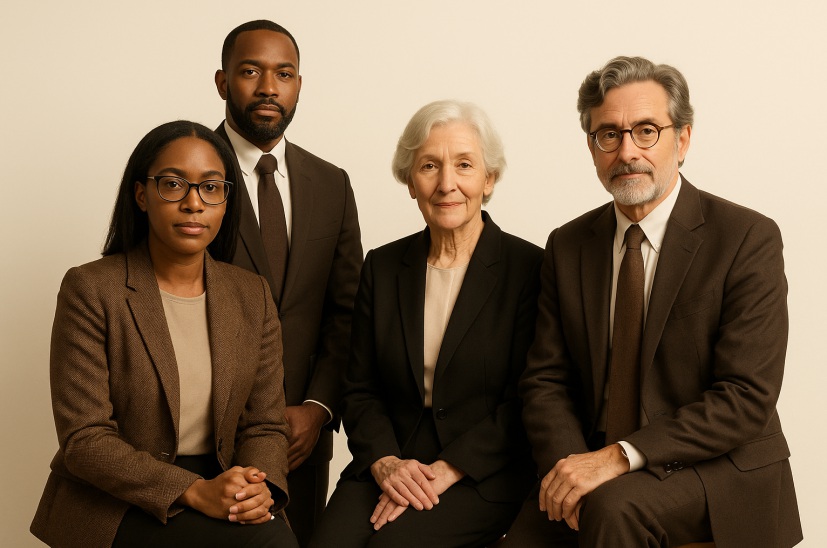
Welcome to the Leitner Summer Human Rights Institute
Join us for an intensive two-week summer program offering graduate students and professionals the unique opportunity to study international human rights law. You will learn from distinguished human rights experts and practitioners and engage with NYC’s vibrant human rights community.
Hybrid Format
The Summer 2024 program will take place June 10-21, 2024. One of the key features of our program is its hybrid, interchangeable live and asynchronous modules, combining in the Institute’s signature format both pre-recorded materials that students can access at their convenience and live lectures.
Certificate & Global Community
Students can choose to earn academic credit; the course certificate in International Human Rights Law will attest to participation. Both the Institute and the associated Program on International Justice and Society are open to students from around the world.
The curriculum covers a wide range of topics through core and elective courses, including Business and Human Rights, Civil and Political Rights, and International Justice. Apply now and join a vibrant global network of human rights advocates.
Program Overview
Explore the Leitner Summer Human Rights Institute Program. Break away from familiar conventions: the student experience is about more than the classroom. Organize your summer around the Leitner Center for International Law and Justice’s Summer Human Rights Institute 2024, mixing tradition and technology, live discussion and distance learning. For two weeks, you will attend daily lectures on cutting edge human rights topics, learn from practitioners and discuss scholarship in a friendly and collegial setting. You will gain insight into current issues in the field and make lifelong connections.
- The Institute gives you seamless access to New York’s broad, diverse and dynamic human rights community: American University, Yale, and other students and faculty regularly attend, and dozens of alumni work in and actively contribute to the program.
- It has educated a generation of human rights and international law advocates, some of whom write guidelines or give advice to UN Human Rights Counselors, while others write guidelines for treating coronavirus-patients from vulnerable and refugee communities.
- 2024 dates: June 10 – June 21, 2024. Earn a certificate of attendance for live and remote participation along with greater program flexibility: After lectures, this year’s masterclasses will be pre-recorded giving participants the chance to attend a wider range of courses.

Distinguished Faculty
Meet our esteemed faculty. The faculty for the 2017 summer session promises to be outstanding. They are all noted experts in the area of human rights law and dedicated teachers of both graduate and professional students in both Europe and the US.
The following is a brief biographical sketch of each:
Stephen J. Whelan teaches in the Graduate Student Program at Leiden Law School in The Netherlands, and teaches International Human Rights Law, including Human Rights Advocacy, at the Borges Foundation in Geneva. He regularly works with practitioners, diplomats and NGOs both in Europe and the United States, including teaching in summer programs in Albania and Ukraine. Before his present positions, he taught in the International Visiting Program and Graduate Student Program at NUI Galway for over a decade. He has an ongoing litigation/public interest practice in asylum and criminal law. He was a recipient of the University “s Highest Teaching Rating in Research”. He has published widely in property and human rights law, with a particular focus on Treaty bodies and ECHRs. He is a founder of ALSA Journal, CPO 2 and Lepanto Public Lecture Series. His research interest lies in aviation disasters.
Dr. Whelan will teach: International Human Rights – Structure & Process and International Human Rights Law – Implementation & Effectiveness.
Dr. Katrien Meire works as the Senior Resilience Officer for the UN Office for Disaster Risk Reduction, where she is involved in view of the 2030 Agenda for Sustainable Development, the Nagoya Protocol on Access and Benefit Sharing, and disaster risk reduction activities to strengthen resilience and prioritize the marginalized.
She also acts as Senior Researcher at the Vrije Universiteit Brussel, where she teaches disaster law, transitional justice and the law of sustainable energy, natural resources and development in the Professor Thomas Braeckman Chair for Development Classification (VUB).
Moreover, Dr. Meire works at the Institute for European Studies that holds the coordination of the FP7 project CASCADES Ladies, explaining her research background in both disaster and peace and conflict studies. Previously, Dr. Meire coordinated the Scientific Committee of the Sixth Research Framework program on Knowledge Management for Integrated Urban Water Management (Unesco K!DDS).
She recently co-edited and authored a Chapter in “Law Beyond Borders: The Extraterritorial Application of European Constitutional Law” (2016).
Dr. Meire will teach: Disaster Law.
Curriculum Highlights
The curriculum comprises 10 two-hour-long modules, offering an intensive study of many important and contemporary substantive areas in human rights law and its sub-topics, thereby covering in detail the most pressing issues in this field.
01
Integrated Human Rights Topics
To this end, the curriculum is vertically integrated with substantive (human) rights issues concerning Business and Human Rights; Vulnerable Groups: Refugees and Internally Displaced Persons; Civil and Political Rights; Economic, Social, and Cultural Rights; Women and Children; and International Justice.
02
Preparation for Human Rights Leadership
The curriculum is designed to prepare participants to grapple with many of today’s human rights challenges, building on the specializations in human rights and strategy these topics provide. Those students most successful in this program will leave with the broad backgrounds – and specific strategies – to become leading human rights actors in their fields in some of the most novel and difficult areas in contemporary human rights law.
03
Specialized Module Focus
- Business and Human Rights: Under Business and Human Rights, participants will study issues such as the international legal framework on human rights and business activity and learn how the UN is implementing that framework, addressing such issues as due diligence, monitoring, and accountability.
- Vulnerable Groups: Under Vulnerable Groups, participants will analyze the ongoing refugee crisis and associated need for assistance. These groups will include children, women, the elderly, and people with disabilities. Throughout this intensive module, students will address the importance of protecting the vulnerable in all human rights plans of action, such as ensuring their freedom from violence, preventing human trafficking, providing education, and otherwise promoting them in our societies and governments.
- Civil and Political Rights: Under Civil and Political Rights, participants will explore the role national courts play in the enforcement and realization of human rights. Participants will also examine ways to realize these rights during times of emergency, particularly in Africa and in the United States.
- Economic, Social, and Cultural Rights: Under Economic, Social, and Cultural Rights, students will study issues such as the right to food, children’s rights, and health care – both globally and in the African context. The module will address key implementation mechanisms of promoting these rights, such as citizen review, city protocol initiatives, and individuals’ abilities to sue for enforcement.
- Women and Children: In addition, through the Women and Children module, participants will study the various types of gender-based violence occurring worldwide, from rape as a weapon of war to child marriage. Participants will also analyze women and children’s rights in employment and family systems.
- International Justice: To round out the curriculum, participants will study the International Justice system. Graduates will leave with the tools to not only understand, but fight for justice in their own countries and communities.
Certificate and Recognition
Increase your credentials and career options with a Certificate in International Human Rights Law. The Leitner Summer Human Rights Institute (SHRI) offers an unparalleled opportunity to discover and learn about human rights law and practice. Upon completion, participants receive a graduate certificate in International Remedial Human Rights Law from the Leitner Center at Fordham Law School, which greatly enhances prospects for employment in the fields of international law, advocacy, or justice.
- Internationally recognized for graduate legal training, the Leitner Center at Fordham Law will professionally accredit study during its annual Summer Human Rights Institute and issue a Certificate in International Human Rights Law to each successful applicant.
- This certificate, accredited by the guiding figures and leaders behind this program, is highly regarded in the independent international human rights sector: academia, law, NGOs, human rights advocacy, and victim advocacy. This certification further demonstrates participants’ training and competencies in this field.
- The program’s expansive curriculum grounds participants with the interdisciplinary factors affecting human rights and prepares them to effectively engage human rights issues from a cross-sectional approach, which is vital in this field.

Global Participation
Join Our Global Community: Learn Human Rights from Anywhere!
The Leitner Summer Human Rights Institute (SHRI) is open to everyone globally, on-site in New York City and online from wherever—no visa needed! No exams! Fellow human rights advocates will join you in the virtual program for novel in-depth conversations and an incredible exchange of global perspectives and creativity!
Our hybrid program includes classes on a wide range of topics, including: Anti-Corruption, Freedom of Association, Gender Equity, Human Rights Advocacy, Women and Children, Refugees, and Business & Human Rights. The hybrid classroom format combines online and in-person learning to promote intercultural learning between our participants, and this year the program is supplemented by a no-additional-cost online course on Space Law, Theory, and Practice.
SHRI provides the opportunity to study specialized content areas like Business and Human Rights, Civil and Political Rights, Human Rights Litigation, International Justice, Worker Rights, and more. Participation in SHRI means being part of a vibrant global network dedicated to advancing the realization of human rights.
Contact Us
Get in contact with SHRI now! If you are thinking about participating in the next program, do not hesitate to let us know. As always feel free to get in touch with us today and we will help answer any questions about the program and/or to clarify any information.
- Our staff is filing the soonest applications possible. We can confirm that we consider applicants on a first-come-first-serve basis depending on contracts with universities.
- Contact the institute and sign up today! This is a rudimentary requirement that all new students must meet.
- Email [email protected], call (832) 939-9983, or write to 1500 Louisiana St Ste 11, Houston TX 77002 and our team will guide you through the process.
